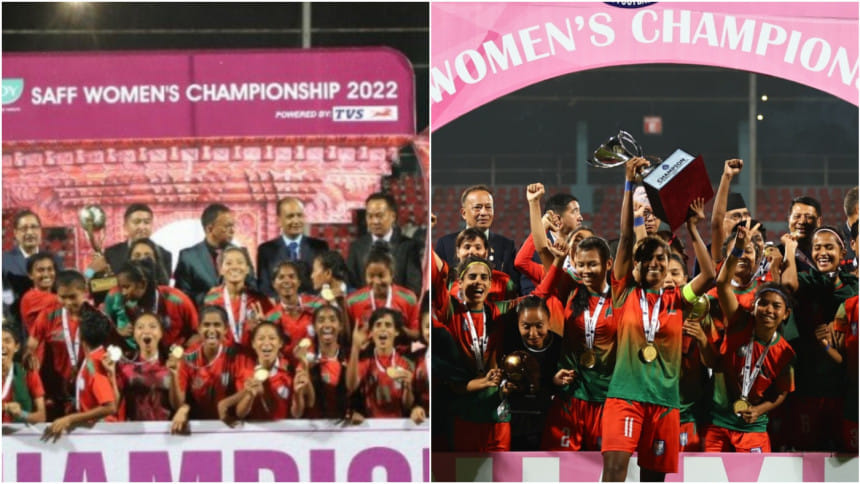What next for Bangladesh’s golden girls?

On Thursday, the champion Bangladesh team received a well-deserved hero's welcome after successfully defending their SAFF Women's Championship title the previous day against the hosts in Nepal.
After landing in Dhaka, Bangladesh's golden girls were adorned with flower garlands, paraded around the city in a specially-made open-top bus with thousands cheering them on from the streets before being greeted with sweets at the Bangladesh Football Federation (BFF) headquarters.
One must wonder, while soaking in the outpour of love from their countrymen in the streets of Dhaka, did a sense of Déjà vu creep into the minds of some of the girls.
Sabina Khatun, for example, who has led the team to the title in both editions, must remember how they had become the toast of the country after bringing home the title in 2022 by beating the same opponents on the same ground.
The procession of felicitation continued for weeks, with each player receiving grand reception upon returning to their respective communities. The praises kept coming in from all corners and various organisations announced financial rewards for the champion team.
The former BFF president Kazi Salahuddin made many promises to the victorious players and why wouldn't he, as the SAFF triumph in 2022 was the crowning achievement of his 16-year tenure at the post.
It took some time, but eventually, the buzz wore off. The fans moved on, the media shifted their focus on to other things and the champion players returned to living and training at the BFF dormitory, away from all the limelight.
The next time the women's team featured in competitive football was almost 10 months later in a two-match friendly series against Nepal at home.
They were scheduled to take part in the Olympic Qualifier's tournament in Myanmar in May of 2023, where they were slotted in Group B alongside the hosts, Iran, and the Maldives.
But just six days before the tournament, BFF announced it would not be able to bear the expenses of the campaign and has pulled out of the competition.
Soon after that, the SAFF winning coach Golam Rabbani Choton also left the job.
Bangladesh took part in the Asian Games in last year's September with just two competitive games under their belt since the SAFF triumph.
The team was set up for disaster and unsurprisingly finished bottom of their group, receiving an 8-0 drubbing by Japan and a 6-1 thrashing by Vietnam.
While the national team was sitting idle, the BFF devoted much of its attention to launching a franchise league for women's football, an idea that sputtered, coughed and finally died.
After achieving Bangladesh's biggest feat in football since the men's team won the SAFF Championship in 2003, Sabina and Co rightly demanded better wages which reportedly ranged from Tk 5000-20,000 at the time.
It took the federation almost 11 months to finally announce improved salaries for the players, with the wages ranging from Tk 20,000-50,000.
However, the BFF has also been guilty of not clearing the dues of the players in time. Reportedly, players of the champion team are yet to receive their salaries for the months of September and October.
The women's league is also suffering from a lack of competition, as none of the premier division clubs in men's football form teams in the women's competition. Bashundhara Kings were the only exception for a few seasons, but they also left the league this year.
In less than two years, the optimism spurred by the triumph in Kathmandu had seemingly evaporated and an acceptance of mediocrity had crept in.
The 1-1 draw against Pakistan in the opening match did not spur any optimism and Monika Chakma saying after the match that new coach Peter Butler does not want to field senior players rang alarm bells of an impending disaster.
But like any feel-good sports movie, right when the chips were down and the team looked down and out for the count, they put aside whatever differences they had, came together and started on a path to resurgence.
It began with a 3-1 win over India, followed by a 7-1 thumping of Bhutan in the semifinal and a hard-fought 2-1 win over Nepal in the final.
And just like that, Bangladesh's golden girls had done it again.
Winning the title back-to-back is definitive proof of Bangladesh being the best in women's football in South Asia at least for a few years.
However, while Bangladesh are languishing at 139th in the FIFA Women's Rankings, runners-up Nepal stand at 99th and semifinalists India are 68th.
The main reason behind this gulf is that Bangladesh don't play as many matches as the former two countries. Nepal, for example, took part in the West Asian Football Federation's Women's Championship in February this year as an invitee while Bangladesh were without any international action.
Still, the girls overcame the mounting odds and came out on top in a triumph that will go down as one of the greatest in Bangladesh's sporting history.
Right after the win over Nepal in the final, the BFF's first order of business was preparing the open-top bus for celebration.
Celebrating this momentous occasion is all well and good, but once the euphoria over this incredible victory subsides, that's when the real task will begin for the newly elected BFF committee, led by president Tabith Awal.
Other than Sabina, all members of the champion team are in their 20s, and about to hit their prime. This is the opportune time to push this side and see how far they can go.
But if the federation remains content with being champions in a regional event that holds little importance in the global context, if the honchos don't dream of making a mark at the continental or global level, it would never come to be.
As they say, it's better to try and fail than to never try at all. This is the time for Bangladesh to try and climb up the ladder in women's football globally.

 For all latest news, follow The Daily Star's Google News channel.
For all latest news, follow The Daily Star's Google News channel. 








Comments